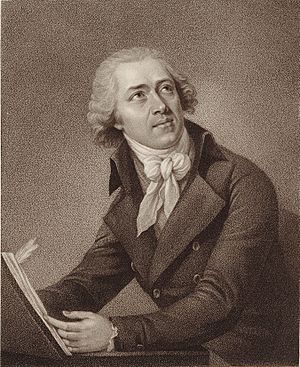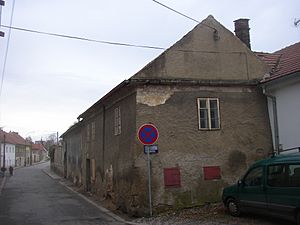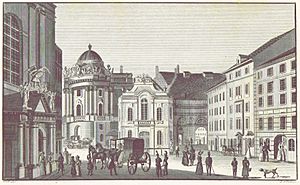Leopold Koželuch facts for kids
Leopold Koželuch (born Jan Antonín Koželuh) was a famous Czech composer and music teacher. He was born on June 26, 1747, in Velvary, a town in what is now the Czech Republic.
He moved to Prague to study music. Later, in 1778, he moved to Vienna, Austria. Vienna was a very important city for music at that time. Koželuch became well-known there as a composer, pianist, and teacher. From 1792 until he died in 1818, he held important royal jobs. He was the Kammer Kapellmeister (music director) and Hofmusik Compositor (composer) for the royal court. He took over these roles after the famous composer Wolfgang Amadeus Mozart died.
Koželuch wrote many different kinds of music. He composed sonatas and concertos for keyboard instruments. He also wrote chamber music, which is for small groups of instruments. His works included choral music and operas too.
Contents
Life and Career
Leopold Koželuch was born on June 26, 1747. His father, Antonín Bartholomäus Koželuh, was a shoemaker. Leopold was given the name Jan Antonín at birth. But by 1773, he changed his name to Leopold. This was to avoid being confused with his older cousin, who was also a composer named Jan Antonín Koželuh.
He started his music lessons in Velvary. Then he moved to Prague to continue his studies. In Prague, he learned from his cousin and from František Xaver Dušek. Dušek taught him how to play keyboard instruments and how to compose music.
From 1771 to 1778, Koželuch wrote ballets and pantomimes. These were performed in Prague and were very successful. Because of this success, he decided to become a musician instead of studying law.
In 1778, Koželuch moved to Vienna. He quickly became known as a great pianist, composer, and teacher. He taught music to many important people, including Maria Theresia Paradis and several royal princesses. One of his royal teaching jobs was to teach Archduchess Elisabeth. He took over this position from Georg Christoph Wagenseil.
In 1781, Wolfgang Amadeus Mozart left his job as court organist in Salzburg. The Archbishop of Salzburg offered this job to Koželuch. However, Koželuch turned it down. He later told a friend he worried he might be treated badly, like he felt Mozart had been.
In 1784, Koželuch started his own music publishing company. It was called Musikalisches Magazin. This company helped him publish many of his own compositions. He also worked with partners in other countries to share his music.
By 1790, Koželuch was very respected. A music writer named Ernst Ludwig Gerber said that Koželuch was "the generally most loved among our living composers." In 1791, he wrote a cantata for the crowning of Emperor Leopold II in Prague. It was very well-received. Mozart also wrote an opera for the same event.
Later that year, Mozart died. Emperor Franz II offered Koželuch Mozart's jobs at court. These were Kammer Kapellmeister (music director) and Hofmusik Compositor (composer). Koželuch even got double Mozart's salary! He kept these important jobs until he died. In 1791, Koželuch also joined a masonic lodge. This was another way he became more connected in Viennese society.
After 1800, Koželuch wrote fewer new compositions. He focused more on his court duties and teaching. He also made a lot of money arranging Scottish, Irish, and Welsh folk songs for a publisher named George Thomson.
Koželuch died on May 7, 1818. His daughter, Catherina Cibbini-Kozeluch, also became a well-known pianist and composer in Vienna.
Musical Works
Koželuch created about 400 musical pieces. These included many different types of music.
- He wrote about thirty symphonies.
- He composed twenty-two piano concertos. One of these was for piano four-hands, which means two people play on one piano.
- He also wrote two clarinet concertos.
- His chamber music included twenty-four violin sonatas and sixty-three piano trios.
- He wrote six string quartets.
- He composed two oratorios (large musical works for voices and orchestra). One of them, Moisè in Egitto, has been performed and recorded recently.
- He also wrote nine cantatas and various church music pieces.
- Koželuch composed operas and ballets. Most of these have not been heard in recent years.
- His arrangements of Scottish songs were very popular. Some of these have also been recorded.
A music expert named Milan Poštolka created a list of all Koželuch's works in 1964.
Keyboard Music
Koželuch was known as a great keyboard player. So, he wrote many pieces for keyboard instruments. Music experts say that his keyboard sonatas were very special. They had a "tragic-pathetic manner" that was similar to later works by Beethoven and Schubert. His sonatas also showed a beautiful singing style, called cantabile.
Koželuch's sonatas are considered "classics." This means they were models for others to learn from. He wrote his first sonata in 1773 and his last ones after 1810. Some sonatas were for showing off a player's skill. Others were simpler. Some even had a Romantic style, which was new at the time. For example, Koželuch wrote slow, minor-key introductions to his sonatas much earlier than Beethoven did.
Koželuch wrote his sonatas for the new fortepiano instrument. This was different from the older harpsichord. The popularity of his sonatas helped make the fortepiano more fashionable.
He also wrote twenty-two keyboard concertos. These pieces were often for smaller groups of instruments. They are known for their clear, graceful melodies and sparkling keyboard parts.
Chamber Music
Koželuch's chamber music from the 1790s was very advanced. It sometimes showed the strong emotions that would be seen in Beethoven's music. A music expert named Roger Hickman said that these works had a "daring character." He also believed that the young Schubert must have noticed them.
Koželuch's only string quartets were written during this time. A set of six quartets became famous all over Europe.
Orchestral and Choral Music
Koželuch probably wrote most of his symphonies during his first ten years in Vienna. A music expert named Allan Badley describes Koželuch's symphonies as "modest." He also says that Koželuch's symphonies were influenced by his teacher, František Xaver Dušek.
Most of Koželuch's choral works have been lost. This includes his cantatas and five of his six operas. However, his opera Gustav Wasa was performed in Finland in 2018. This was the first time it had been heard since Koželuch died.
Images for kids
-
.
Prague – Kotzen Theatre
See also
 In Spanish: Leopold Kozeluch para niños
In Spanish: Leopold Kozeluch para niños
 | Jessica Watkins |
 | Robert Henry Lawrence Jr. |
 | Mae Jemison |
 | Sian Proctor |
 | Guion Bluford |







